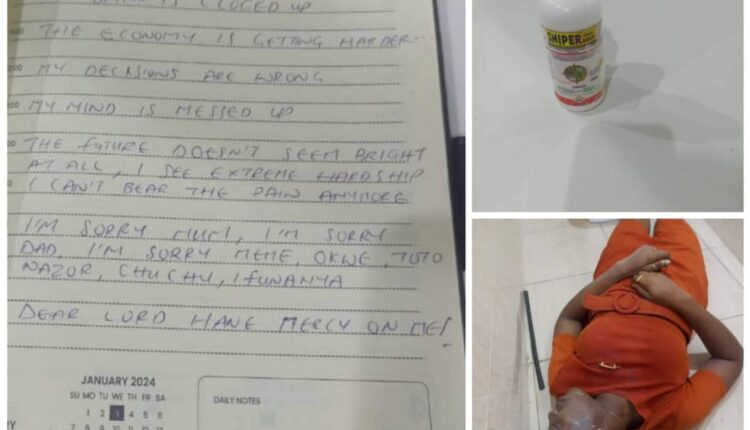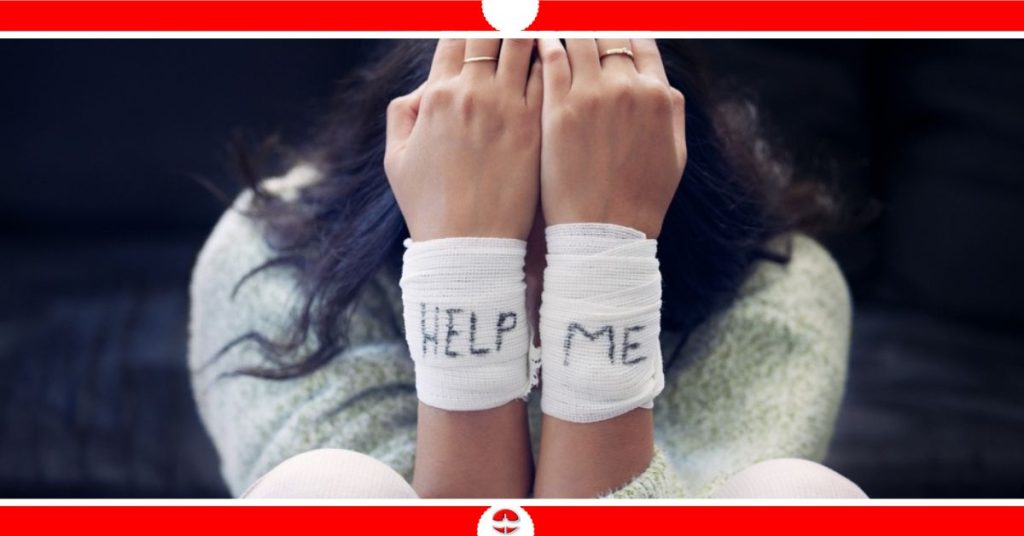“The way in which a woman accepts her fate and all the suffering it entails, the way in which she takes up her cross, gives her ample opportunity – even under the most difficult circumstances – to add a deeper meaning to her life.”
Again, it was news that someone committed suicide and the ‘Ohs’ and ‘Ahas’ and ‘RIPs’ and the ‘blame game’ were all over social media. Before we knew it, politics, business, entertainment, and religion took center stage as breaking news and suddenly, we forgot that behind the headline, a life is gone.
Suicide is not a fancy word or a topic that we talk about often. Yet every time it rears its head, we tend to ask rhetorical questions out of pity, “What happened?”, Why?”, and then we move on as though nothing happened until the next news of another person surrendering to death. Human nature!
A permanent “solution” to a temporary problem that doesn’t end the chances of life getting worse, instead, it eliminates the possibility of it ever getting any better. So, why choose suicide?
“Nothing is working in my life. My figures are low. My brain is clogged up. The economy is getting harder. My decisions are wrong. My mind is messed up. The future doesn’t seem bright at all. I see extreme hardship. I can’t bear the pain anymore. I’m sorry mum, I’m sorry dad, I’m sorry Nene, Okwe, Toto, Nazor, Chuchu, Ifunanya. Dear Lord, have mercy on me!”.
A suicide note had these written words above as the last of a 32-year-old Amarachi Ugochukwu, a bank staff who gave up on herself, gave up on her friends and family, gave up on life, and just gave it all up. Just like that, it’s the end for her, but to what purpose? An escape?
“If there is a meaning in life at all, then there must be a meaning in suffering. Suffering is an ineradicable part of life, even as fate and death. Without suffering and death, human life cannot be complete.” Death will come for us all anyway, but it’s a sad thing to choose death when you have life.
Suicide is not a show of courage and it’s not a solution either. We could be cynical all we want and ask all the typical questions when things like this occur, but Amarachi won’t rise from the dead to explain herself. She gave up the one thing she had control over, the one thing no one could take away from her – the ability to choose in any given set of circumstances, to choose her own way and what she wanted out of life. She chose death.


It’s vain to be judgmental in situations like this. Everyone’s story is unique, our capabilities differ and so is how we understand life, how we perceive ourselves, and how we handle the challenges we face. You have to be in someone else’s shoes to know where it hurts and how it feels.
…
You’ll like to read this (open in a new tab): Depression Is Your Soul Talking To You
…
The life of Amarachi, like others who couldn’t bear inhaling another breath of misery, was a constant battle. They fight shadows that no one sees. Shadows of self-doubt, depression, fear, insecurity, lack, people pleasing, feelings of not being enough, the pursuit of perfection and happiness, the weight of expectations… and behind their smiles and laughter, these shadows linger and cut deep into their spirits and souls. If only they could wait to hear this again:
There is always another choice! If only Amarachi could listen to this again and really think it through.
“And there are always choices to make. Every day, every hour, offers the opportunity to make a decision, a decision which determines whether you would or would not submit to those powers which threaten to rob you of your very self, your inner freedom; which determines whether or not you would become the plaything of circumstance, renouncing freedom and dignity to become molded into the form of the typical inmate” (inmate of the dead through suicide) – Viktor Frankl, Man’s Search for Meaning.
There’s always a choice to make. And of course, we all fight these shadows, or some of them every day, and you could say nothing in the world would make you think of suicide. Thank God for you, but how about others who haven’t developed the mental strength and a thick skin as you?
Shattered dreams, the weight of unpaid bills, debts, joblessness, dysfunctional homes and marriages, strained relationships, and stunted career growth, any or all of these could lead anyone to a moment of profound despair to think suicide is the best escape. Sadly, too many people find themselves entangled in this false narrative and make a decision at the expense of their lives.
The ripple effect of such a decision reaches far beyond the confines of personal struggles, extending into the lives of friends, family and anyone associated with the people who throw in the towel. What suicide does is transfer the pain and suffering onto the shoulders of those left behind. It doesn’t end it all.
In our darkest hours, when thoughts are clouded by despair, it’s difficult to find a flicker of hope as encouragement to keep striving and fighting our shadows. But then, we must understand that our struggles for survival are not the sum total of our existence. There’s always more to life and there’s always a lifeline.
The many cases of suicide should prompt us to re-evaluate how we approach mental health and the struggles faced by those around us. It’s a call to action to create a world where individuals burdened by hardship, relationship issues or any other problems feel empowered to seek help without judgment or stigma.
Beyond the shadows of despair and depression lies an opportunity for society to extend a collective hand, offering support, understanding, and resources to those who need it most. Mental health resources, counseling services, and community support can act as lifelines, helping individuals navigate the stormy seas of their emotions.
…
You’ll like to read this too (open in a new tab): Not Happy? Here’s A Guide To Finding Joy
…
We need each other! We need to encourage people suffering to reach out for help and impress on them that reaching out for help is not a sign of weakness but a courageous step toward healing. We need to create communities that embrace vulnerability and help each other to recover, to grow, and to keep hope alive on this journey called life.
No one needs to do life alone, and life doesn’t have to be a struggle. Let us remember that behind the statistics and the headlines are real people – people like Amarachi, whose stories should remind us that life is really tough for some people and our words and actions, no matter how small, can have a profound impact on the lives of others.
In memory of those like Amarachi Ugochukwu, let us strive to be beacons of compassion, illuminating the path toward healing and support. Suicide may seem like an escape, but it leaves behind a legacy of pain.
Together, let’s build a world where empathy triumphs over despair, and where every individual, no matter how burdened, can find the support they need to face life’s challenges with resilience and hope.
About The Author
Michael Olajubu
Michael Olajubu is a poet, author and creative web content developer who believes in God. He is currently the lead content writer at The Truth Media Blog.











More Stories
Revenge Won’t Make You Feel Better
Pornography Addiction: Is There Hope?
Not Happy? Here’s A Guide To Finding Joy